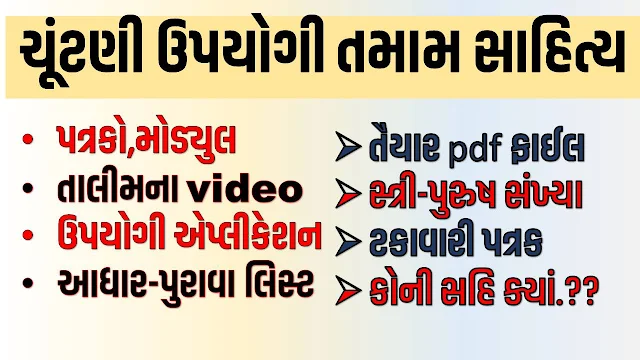VERY USEFUL MATERIAL FOR ELECTION - BLANK FORMS AND APPLICATION
Title: India's 2024 Lok Sabha Elections: A Critical Juncture in Democracy
Introduction:
India, the world's largest democracy, gears up once again for its quintessential political spectacle—the Lok Sabha elections. The year 2024 marks a critical juncture in the nation's political landscape, characterized by intense campaigns, ideological battles, and voter scrutiny. As the electorate prepares to exercise its constitutional right, the 2024 Lok Sabha elections stand as a pivotal moment shaping the trajectory of Indian democracy.
પ્રિસાઇડિંગ ઓફિસરની એપલીકેશન માટે CLICK HERE
Political Landscape:
The political canvas of India is a vibrant mosaic of ideologies, regional dynamics, and socio-economic factors. The 2024 elections witness the continuation of a multipolar political scenario, with national and regional parties vying for supremacy. The incumbent Bharatiya Janata Party (BJP), led by Prime Minister Narendra Modi, seeks to consolidate its power, leveraging its developmental agenda and nationalist narrative. In contrast, the opposition, comprising the Indian National Congress and regional parties, endeavors to forge alliances and offer alternative visions for governance.
અવસર લોકશાહીનો ચુંટણી તાલીમ મોડ્યુલ માટે CLICK HERE
કોની સહીઓ ક્યાં લેવી તે માટે CLICK HERE
મતદાન માટે માન્ય ૧૪ ઓળખના પુરાવા CLICK HERE
E- ચુંટણી ટકાવારી EXCEL ફાઈલ માટે CLICK HERE
E- ચુંટણી ટકાવારી EXCEL ફાઈલ - 2 માટે CLICK HERE
ચુંટણી સ્ટાફે માર્ગદર્શન માટે વિડીઓ સંગ્રહ ફાઈલ માટે CLICK HERE
P1, P2, P3 તાલીમ મોડ્યુલ માટે CLICK HERE
Political Landscape:
The political canvas of India is a vibrant mosaic of ideologies, regional dynamics, and socio-economic factors. The 2024 elections witness the continuation of a multipolar political scenario, with national and regional parties vying for supremacy. The incumbent Bharatiya Janata Party (BJP), led by Prime Minister Narendra Modi, seeks to consolidate its power, leveraging its developmental agenda and nationalist narrative. In contrast, the opposition, comprising the Indian National Congress and regional parties, endeavors to forge alliances and offer alternative visions for governance.
Key Issues:
The electoral discourse in India is dominated by a plethora of pressing issues that resonate with the diverse electorate. Economic revival post-pandemic, agrarian distress, unemployment, social justice, healthcare infrastructure, and national security are among the paramount concerns driving voter sentiments. The parties' ability to articulate coherent policies addressing these issues will significantly influence their electoral fortunes.
ચુંટણીની વધુ માહિતી માટે CLICK HERE
Campaign Dynamics:
Electioneering in India is a high-stakes affair characterized by frenzied rallies, extensive media coverage, and strategic messaging. The 2024 elections witness a paradigm shift in campaign dynamics, with digital platforms emerging as pivotal battlegrounds for political narratives. Social media campaigns, influencer endorsements, and data analytics play an instrumental role in shaping voter perceptions and mobilizing support.
Electoral Reforms:
The conduct of free, fair, and transparent elections is paramount to the integrity of India's democratic process. The Election Commission of India (ECI) spearheads efforts to ensure electoral integrity through robust mechanisms, including voter registration drives, electronic voting machines (EVMs), and strict enforcement of the Model Code of Conduct. However, concerns regarding electoral malpractices, including money power, electoral violence, and polarization, persist, necessitating continuous reforms to safeguard the sanctity of elections.
Regional Dynamics:
India's federal structure bestows significant political autonomy upon its states, thereby shaping the electoral landscape. Regional parties wield considerable influence in their respective territories, often determining the outcomes of Lok Sabha elections. States such as Uttar Pradesh, West Bengal, Bihar, and Tamil Nadu emerge as crucial battlegrounds, where local dynamics and caste equations profoundly influence electoral outcomes.
Coalition Politics:
The era of single-party dominance in Indian politics has given way to coalition politics, necessitating alliances and pre-poll arrangements. The 2024 elections witness the proliferation of strategic alliances and electoral pacts, with parties leveraging collective strength to counter the incumbent's hegemony. The ability to forge cohesive alliances, navigate ideological divergences, and accommodate regional aspirations emerges as a key determinant of electoral success.
Role of Youth:
India's demographic dividend, characterized by a burgeoning youth population, assumes significance in shaping electoral outcomes. Youthful voters, comprising a substantial portion of the electorate, wield considerable influence in determining political fortunes. Parties increasingly focus on youth-centric policies, leveraging social media and youth icons to resonate with this demographic segment.
Conclusion:
The 2024 Lok Sabha elections in India epitomize the vibrancy and resilience of its democratic ethos. As the nation embarks on this electoral odyssey, it confronts myriad challenges and opportunities that will define its political landscape for years to come. With the electorate poised to exercise its sovereign mandate, the 2024 elections underscore the enduring spirit of democracy and the imperative of inclusive governance in shaping India's future.

.gif)

Comments
Post a Comment